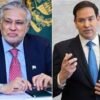ISLAMABAD: The Supreme Court of Pakistan resumed its crucial hearing on the legality of civilian trials in military courts on Monday, with the Ministry of Defence’s counsel, Khawaja Haris, presenting a detailed defense of the military’s jurisdiction. However, he was unable to complete his arguments, prompting the bench to adjourn proceedings until Tuesday.
A seven-member constitutional bench, led by Justice Aminuddin Khan and comprising Justices Jamal Khan Mandokhail, Musarrat Hilali, Muhammad Ali Mazhar, Hasan Azhar Rizvi, Naeem Akhtar Afghan, and Shahid Bilal, is hearing petitions challenging the trial of civilians in military courts a matter that raises significant constitutional questions about the separation of powers and judicial oversight.
Khawaja Haris argued that under the Pakistan Army Act, the armed forces have the legal authority to arrest civilians involved in offenses such as vandalizing military installations or stealing military property. He emphasized that, in such cases, military jurisdiction is applicable, citing judicial precedents, including rulings by former Chief Justice Saeed-uz-Zaman Siddiqui.
However, Justice Jamal Mandokhail raised critical concerns about the constitutional foundation of these trials, pointing out that military courts do not seem to fall under Article 175 of the Constitution, which governs the structure and authority of regular courts. In response, Haris maintained that court-martial proceedings derive their legitimacy from separate constitutional provisions and the Army Act.
Justice Mandokhail further questioned the procedural aspects of such cases, specifically how First Information Reports (FIRs) are registered and how investigations are conducted. He emphasized that, under Section 2(d) of the Army Act, an individual becomes an accused only after a formal charge sheet is filed.
Justice Muhammad Ali Mazhar underscored that the filing of an FIR is a legal prerequisite for any arrest, while Justice Hasan Azhar Rizvi noted that detainees must be presented before a magistrate—a practice that is not typically followed in military court proceedings.
In a notable observation, Justice Mandokhail highlighted the judiciary’s limited role in evaluating the potential impact of its decisions on terrorism, stating, “Controlling terrorism is Parliament’s job, not the court’s.” He cautioned against the court becoming entangled in policy decisions, as doing so could compromise its constitutional duty to interpret the law impartially and without external influence.
Khawaja Haris responded by arguing that numerous judicial decisions support the use of military courts in specific national security contexts. He contended that Parliament has the legislative competence to determine the appropriate forum for trials, and that military courts serve a valid function under extraordinary circumstances.
Despite the intense deliberations, the hearing concluded without a final ruling, and the bench adjourned until Tuesday.



